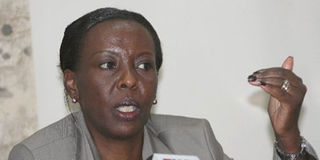Rwandan foreign minister backs attempts to control the media

Rwandan Foreign Minister Louise Mushikiwabo Photo/AFP
Washington, Thursday
Rwanda needs to tightly control journalists and politicians to prevent the ethnically divisive rhetoric that sparked a 1994 genocide, Foreign Minister Louise Mushikiwabo said yesterday.
Rwandan President Paul Kagame is expected to win an August 9 election, but critics have expressed concern about an increasingly repressive environment ahead of the poll in the impoverished central African nation.
Mr Kagame won praise for rebuilding political institutions and attracting foreign investors after the genocide, when about 800,000 ethnic Tutsis and moderate Hutus were killed. But he is also accused of trampling political and press freedoms.
“Politicians, people who want to run for office, people who want to lead Rwandans today, need to stay away from some of the rhetoric that is bound to take people back to where they were,” Ms Mushikiwabo, who describes herself as an independent politician, told Reuters in an interview in New York.
“This is not a matter of freedom of expression.”
“Anybody who’s going to have any influence in politics in Rwanda has to talk about issues and not talk about genocide ... (not) bring very dangerous language in terms of Hutu/Tutsis division,” she said.
UN Secretary-General Ban ki-Moon told President Kagame during a meeting in Madrid last week that he was concerned about several recent incidents that raised political tensions in Rwanda. Mr Ban also stressed the need to uphold human rights.
An aspiring Rwandan opposition politician, Andre Kagwa Rwisereka, was found murdered last week. Rwandan police said they had arrested a business associate of Rwisereka.
A journalist critical of Mr Kagame’s government was shot dead outside his home last month.
Earlier this month a newspaper editor was arrested and two newspapers were suspended in April on charges of genocide denial and reviving ethnic hatred.
Mr Kagame’s administration denies any involvement in the shooting of the journalist and rejects accusations of repression, saying it has pursued dialogue and accepted opposing views.
“Rwanda has been very secure, very stable over the last many years and so any security incident in Rwanda raises eyebrows,” Ms Mushikiwabo said. “There is a level of hype with the incidents that have happened in Rwanda.”
“What is clear on the ground in Rwanda is this level of hype and worry is definitely not there,” she said. “It’s very unfortunate because it gives a picture of Rwanda which is really very slanted.”
Meanwhile, President Kagame said yesterday he was confident of re-election on August 9 as he kicked off a campaign already tarnished by a string of political assassinations and arrests.
The 52-year-old leader, who has ruled Rwanda since his Rwandan Patriotic Front (RPF) ended the 1994 genocide by extremists from the Hutu majority against his Tutsi minority, insisted the country was free to choose.
“Rwandan voters have the freedom to decide. But we have to seek their support and explain how we deserve their support,” Kagame told reporters in Kigali on the first day of the three-week official campaign.
But with the main opposition parties already effectively out of the running, few people, including Kagame himself, appeared to have any doubt on the outcome of the vote.
“I’m very confident that Rwandans will choose to work with RPF but I don’t take anything for granted,” Mr Kagame said.
The RPF is planning to spend two million dollars on the campaign, all from “voluntary contributions”, according to Kagame’s campaign coordinator Christophe Bazivamo.
Challenging Kagame are Deputy Speaker Jean-Damascene Ntawukuriryayo, running for the Social Democratic Party, as well as the Liberal Party’s Prosper Higiro and the Party of Progress and Concord’s Alvera Mukabaramba.
Those three movements supported Kagame during the 2003 presidential election and are described by other parties as the RPF’s “political satellites”, token opposition used to maintain a facade of pluralism.
The Unified Democratic Forces has not been officially registered by the authorities and its leader, Victoire Ingabire, has faced legal action since April after being accused of negating the genocide and abetting terrorism.
The Social Party (Imberakuri) faces similar problems and its leader Bernard Ntaganda has been behind bars since June 24. “She associated herself with those who carried out the genocide,” Kagame said Tuesday to justify sidelining Ingabire.
Several senior army officers have been arrested in recent months and one general, Faustin Kayumba Nyamwasa, narrowly survived an assassination attempt in exile in South Africa.
An opposition journalist who claimed to have uncovered the regime’s responsibility in the attempted murder was shot dead days later.
In a country known for almost non-existent crime, Kagame insisted Tuesday that the latest murders were not politically motivated.
“There is nothing to gain from that... Why would the government be that stupid? I think there is something terribly wrong. People jump to conclusions without evidence,” he said.




